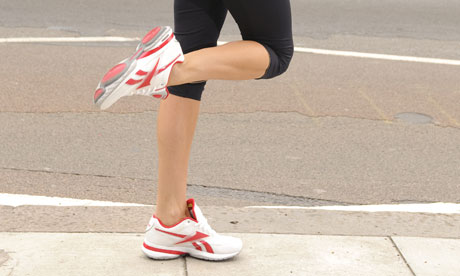
Thousands of people who bought Reebok "toning shoes" to strengthen and tone their bodies could get a refund after the trainer manufacturer agreed to pay out $25m (£16m) to settle false advertising charges.
The settlement came after US consumer watchdog the Federal Trade Commission ruled that Reebok's claim that its EasyTone or RunTone shoes could strengthen hamstrings, calves and buttocks "just by walking" was unsubstantiated.
Reebok's advertisements said the shoes strengthened hamstrings and calves by up to 11% more than regular trainers, and toned the buttocks by up to 28%, the FTC said. "We did get consumer complaints. We watch TV. We read the newspapers," said David Vladeck, head of the FTC's consumer protection bureau. "There is no such thing as a no-work, no-sweat way to a fit and healthy body."
Reebok pulled the advertisements during the FTC investigation and is barred from repeating the claims. The refunds to customers will be made available either directly from the FTC or through a court-approved class-action lawsuit.
Toning shoes are designed to be slightly unstable. Manufacturers often claim that this instability requires wearers to work harder when walking, thereby strengthening their muscles. Toning shoe sales in the US increased from $17m in 2008 to nearly $1bn last year.
A variety of companies advertise toning shoes, including New Balance, Skechers, Ryka and Avia.
Skechers acknowledged in August that the FTC was looking at its advertisements for its Shape-ups and other toning shoes.
Reebok's EasyTone and RunTone running shoes have sold for around $80 to $100 (£51–£64) a pair, while EasyTone flip-flops cost about $60 (£38) a pair. Ads for the shoes claimed that sole technology featuring pockets of moving air created "micro instability" that toned and strengthened muscles.
"The FTC wants national advertisers to understand that they must exercise some responsibility and ensure that their claims for fitness gear are supported by sound science," said Vladeck. Despite the settlement, Adidas, which owns Reebok, said it disagreed with the FTC and stood behind the claims made about its toning shoes.
"In order to avoid a protracted legal battle, Reebok has chosen to settle with the FTC. Settling does not mean we agreed with the FTC's allegations; we do not," the company said in a statement.
But the US settlement follows a similar case in the UK where the Advertising Standards Authority banned a magazine advert about Reebok EasyTone Curve trainers and barred a TV advertisement from being broadcast again without substantial revisions.
In a ruling last December, the ASA said the claims in both advertisements were unsubstantiated and misleading. It said that Reebok had not provided "robust, scientific evidence" to support the claims, which were based on the results of an unpublished study carried out on behalf of the trainer manufacturer.
The ASA also upheld a complaint against Trimsole shoes, sold by Direct Beauty Products Ltd, over unsubstantiated claims that the footwear could "turbocharge your toning" to give you "slim and slender legs" just by strolling.

